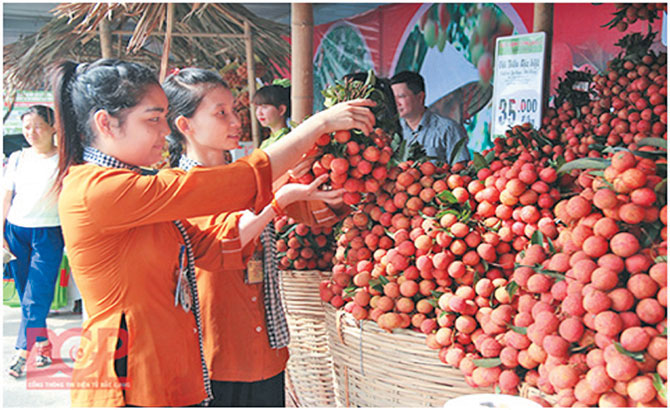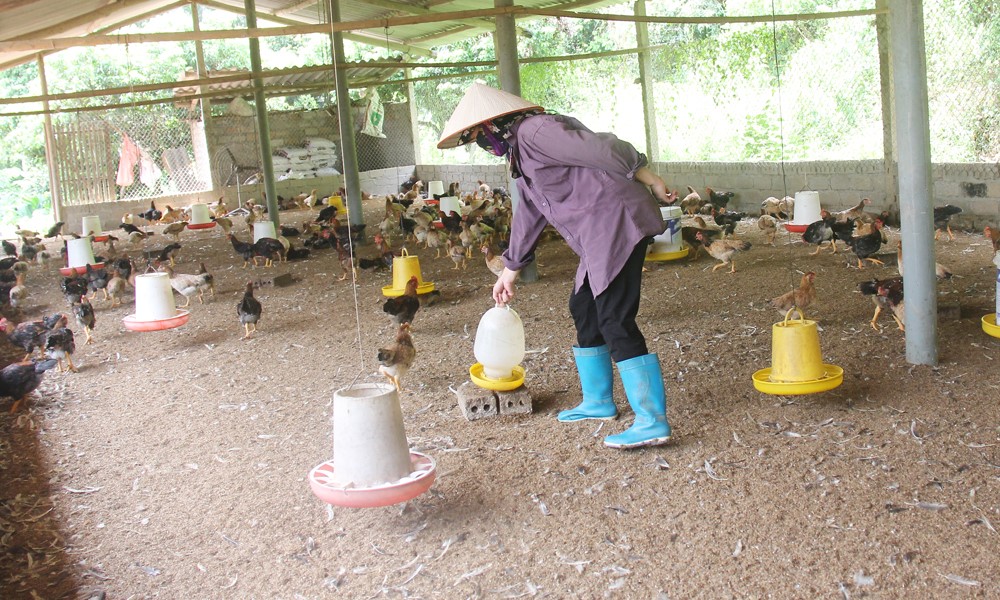Value chain when farmers partner with businesses

|
|
The “Luc Ngan-Bac Giang Lychee Week in Hanoi” attracts a large number of entrepreneurs and consumers, helping to connect supply and demand. |
Narrowing production – consumption gap
Agricare Vietnam Co. Ltd is a leading business in supplying services and trading agricultural products, which was recognised as a nation-level partner by the Vietnam Cooperative Alliance. Having acknowledged big business opportunities in Bac Giang, it has cooperated with cooperatives and residents in Luc Ngan district to grow lychees under GlobalGAP standards for sales in supermarkets and for export. It is applying this method to orange, grapefruit and rice cultivation in the province. General Director Dam Quang Thang said his company cooperates with farmers through cooperatives and production associations to ensure product safety and supply sources. “Last year, more than 10 tonnes of Luc Ngan lychees were easily exported to Australia since they met five requirements set by this country regarding farming area, package, label, irradiation and quarantine. In 2017, our company will take part in zoning off cultivation areas and work with farmers to produce and manage the quality of agricultural products from caring, harvesting to processing and exporting to Australia by sea,” Thang stressed.
Also benefiting from the participation in value chains, tens of noodle making households in Dinh Ke ward (Bac Giang city), Nam Duong commune (Luc Ngan district), and Ngoc Chau commune (Tan Yen district), through specialised cooperatives, have made products under the brand name “My Ke” (Ke Noodles), “My Chu” (Chu Noodles) and “My Chau Son” (Chau Son Noodles) with stable orders from enterprises. Director of the Ke Noodles Cooperative Giap Dong Phong said: “Each year, our cooperative provides some 1,400 tonnes of noodles for Bac Ninh, Nghe An, Hai Phong and Hanoi. Thanks to the help of the provincial Department of Industry and Trade, the volume of noodles supplied for Hanoi increased sharply last year when we cooperated with some businesses in the capital city. Order-based production has encouraged cooperative members to focus on making high-quality products.”
In Yen The district, thousands of chicken farming families have also tightened partnerships with buyers, cooperatives, the Yen The chicken association, and processors, forming a value chain from production to consumption. Nguyen Xuan Hieu, the owner of a chicken farm in Dong Tam commune, said: “Farmers have inked contracts with businesses to raise chickens under safety standards and with double checks. In turn, businesses also process chicken in modern lines to meet customers’ demand and for sale in modern supermarkets.”
Enterprises affirm central role
In recent years, win-win partnerships among businesses, cooperatives and farmers have been growing. Nguyen Van Tien, Director of the Department for Agriculture and Rural Areas under the Party Central Committee’s Commission for Economic Affairs, said “that is an inevitable trend of mass production.” Production is still conducted by separate households at present. It is a must for farmers to connect with enterprises and cooperatives under value chains to ensure sustainable development. In that connectivity, businesses are a key factor which provide materials and ensure the sale of goods while cooperatives organise production activities and connect farmers with companies. Once this relationship is promoted, the quality and quantity of goods are ensured, while their origins are easily traced, thereby meeting the modern market’s demand.
Enterprises have many advantages in seeking and expanding markets. When joining value chains, they will apply themselves to expanding distribution networks, proactively signing purchase contracts, and working with cooperatives and farmers to develop brands. Therefore, businesses act as a driving force encouraging farmers and cooperatives to work harder to satisfy the market’s demand. They are a key force in applying technologies to production and guiding other factors’ development. Tien said thanks to companies’ purchase of agricultural products, many major production areas have been formed in Bac Giang, where produce fruits, peanut, rice, chicken, vegetables, and craft products.
With the strong engagement of businesses, a large number of products have been sold in modern distribution channels or shipped abroad, winning consumers’ trust. Aside from this connection model, the provincial Department of Industry and Trade has also taken creative measures to promote trade and help companies sell goods. For example, in the 2016 lychee crop, the department gave consultation to ensure the successful organisation of the “Luc Ngan-Bac Giang Lychees Week in Hanoi”, thus creating favourable conditions for businesses to ink contracts and ensure stable lychee supplies for Big C, Co.op Mart and Hapro supermarkets.
The department also advised the provincial People’s Committee to sign a cooperation agreement with Hanoi on producing and selling products in the North’s biggest market. Through this cooperation deal, Hanoi has also offered opportunities for prestigious distributors to connect with producers, supplying Bac Giang’s products for retail outlets. Director of the provincial Department of Industry and Trade Tran Quang Tan said thanks to this commitment, 48 key products of Bac Giang have been easily promoted and sold in Hanoi. The sale remains the most difficulty facing agricultural products, as well as other commodities. Basing on businesses’ connection experience in selling key products, the department will enhance trade promotion and invite domestic firms to join in selling local goods.
Close “links”
If a value chain is considered as a train, each member is a “carriage” which must be strongly associated and operate harmoniously with each other in a favourable environment created by state agencies. Agricare Vietnam General Director Dam Quang Thang said his company will join farmers in controlling product quality because in this chain, it has a big sense of responsibility towards consumers. To do so, the business needs support from local authorities in zoning off cultivation areas, applying techniques, and linking with farmers. It also needs a more optimal business environment. For farmers and cooperative members, their products will be sold stably only when businesses buy in large amounts, and their goods satisfy safety standards, domestic and international export requirements and have traceable origins.
Advocating the need for stronger cooperation between enterprises and farmers, many people said local authorities should play a more active role in protecting and solving difficulties in the connection process. “The industry and trade sector will renovate its assistance to businesses by regularly providing information about the production situation and domestic market and export demand. Companies will also have more chances to participate in exhibitions and fairs so that entrepreneurs, craft villages, cooperatives and producers can seek opportunities to promote trade, connect supply-demand, expand markets and help made-in-Bac Giang goods reach out further to other destinations,” Tran Quang Tan noted.
Cao Minh Ngoc
 Bắc giang
Bắc giang








Reader's comments (0)